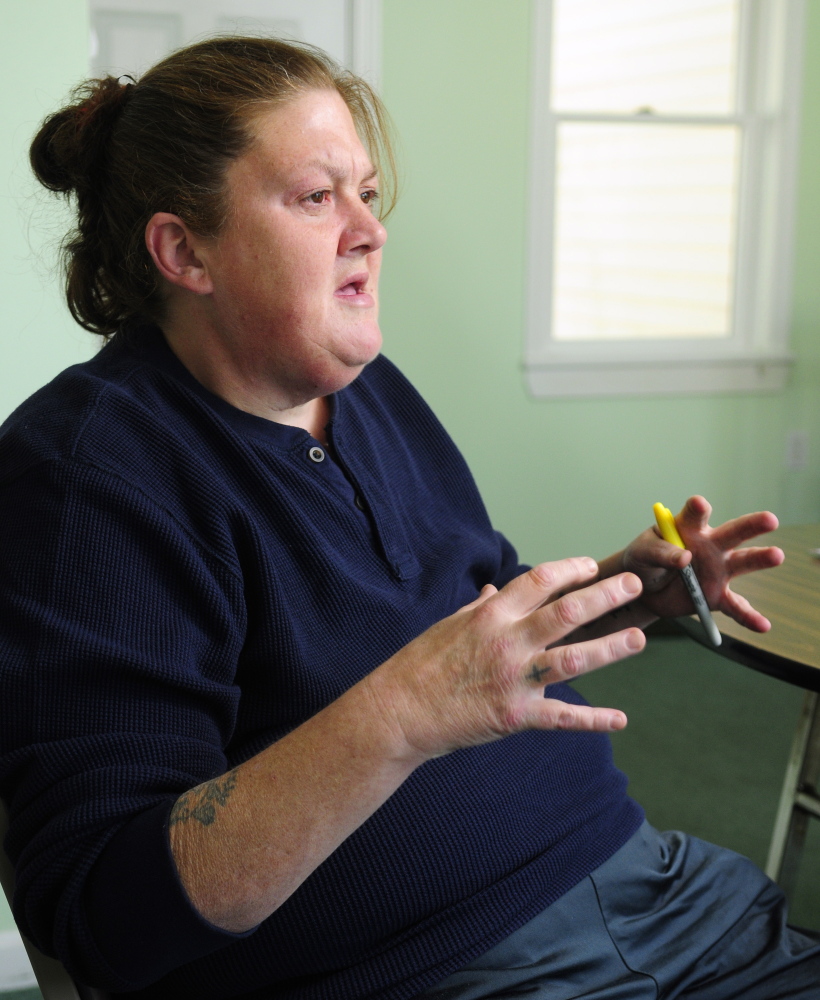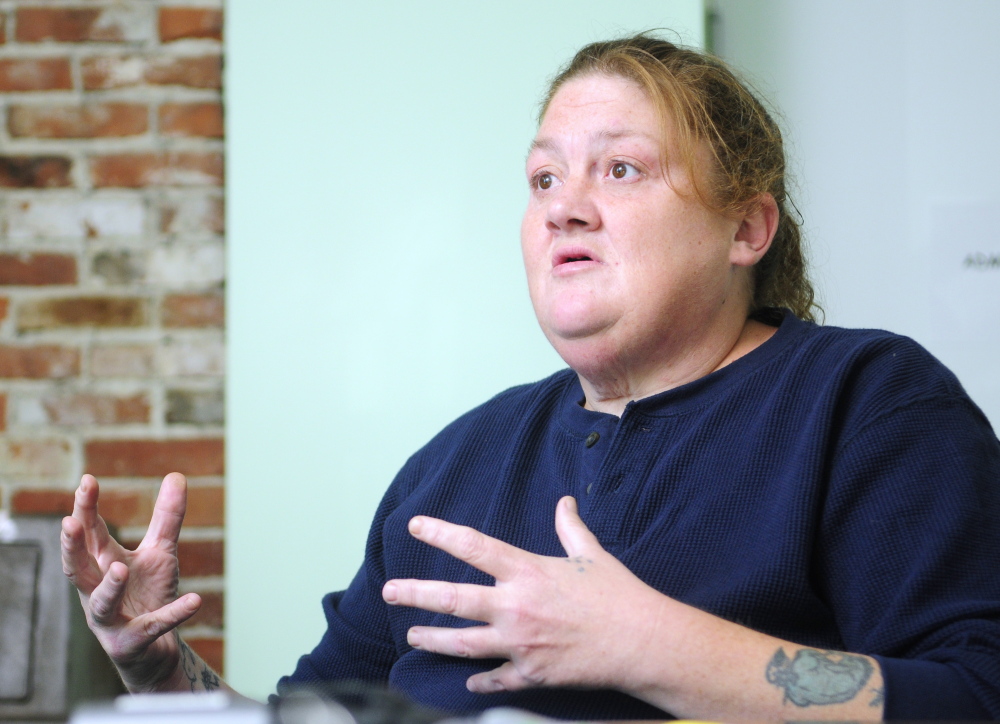AUGUSTA — If Alicia Hafford had known someone who could’ve helped her before she became homeless last year, she likely never would have ended up living on the streets for six months, wondering where her next meal and shelter from winter’s cold would come from.
“I didn’t understand there were people out there who could help,” said Hafford, 45, of Augusta. A mental health consumer who suffers from post-traumatic stress disorder, social anxiety disorder and severe depression, Hafford secured an apartment in June and is now a peer counselor at LINC Wellness and Recovery Center in Augusta.
That someone with the knowledge to make a difference doesn’t have to be a family member or even a friend. That someone could be a landlord, a fellow tenant, a co-worker, a police officer, or anyone else with the knowledge and empathy either to help directly or know how to find someone who can.
The National Alliance on Mental Illness Maine is now offering “mental health first aid training” to increase the number of those “someones” who can help a person with a mental illness.
The organization is partnering with the Augusta Housing Authority in two upcoming training sessions targeted at landlords and tenants of low-income housing. The goal is to give landlords and tenants the ability to better recognize and understand people with mental illness before a mental health issue escalates into a crisis that could lead to eviction.
“We want to help landlords who may not understand how to respond when one of their tenants has a mental health problem,” said Jenna Mehnert, executive director of NAMI Maine. She said the alliance hears from a lot of people with mental health problems who get evicted.
So, too, does Hafford hear of similar situations in her peer counseling. She said some landlords, and some people in general, are scared of people with mental illnesses, because they don’t understand them.
She said only a small percentage of people with mental illnesses are violent, but because people don’t understand it, there is still a stigma attached to being a person with mental illness.
“People are scared to take a chance on you,” the easygoing Hafford said. “If landlords were better educated in mental illness and give us a chance, they’ll find out we can be productive members of society. We’re not hard to deal with. We just have other ways of going about life. We just need to find our niche in the world.”
WAYS TO HELP
Mehnert noted the goal of the training is not to make people clinicians, but just to give them enough knowledge to be comfortable with people with mental illness and to help them find the resources they need before a crisis occurs.
She cited, as an example, a man with a mental illness who called the alliance’s hot line seeking help. He had started a new prescription medication that made him very hot. He couldn’t figure out the automated controls of his apartment’s heat to turn it down, so he opened a window.
The landlord saw the open window and was frustrated the tenant was letting the heat out of his building. After the tenant called NAMI, a representative from the organization called the landlord to explain the situation.
“He was very receptive,” Mehnert said of the landlord. “He went in to help him set the thermostat. Problem solved.”
Amanda Bartlett, executive director of Augusta Housing Authority, said the training fits in well with the authority’s goal of increasing housing stability. She said the root cause of some conflicts between tenants and landlords can be a mental health issue.
“It’s something we face every day,” Bartlett said. “We’ve got three families right now on the brink of losing their housing due to mental health concerns which lead to conflicts with landlords. We have a lot of mom and pop landlords, and if they’ve never dealt with someone with mental health issues, they don’t know what to do, and they may try to move them out of their building.”
Bartlett noted the training could also benefit tenants, both those with and without their own mental health issues, in that they could better recognize a developing problem.
She said tenants in crisis left unaddressed could damage an apartment or be disruptive to other tenants.
One extreme example came in May, when David Malia, 59, who lived in an apartment building on Cedar Court, lit cardboard on fire in his living room and put it on a couch and bookcase in an attempt to commit suicide. One man escaped the fire by jumping out a window onto a roof, and other residents, including two children, escaped unharmed.
In August, Malia was found not criminally responsible for his actions and was sent to Riverview Psychiatric Center for treatment.
AVOIDING EVICTION
Royce Watson, a landlord who oversees some 170 units in the Augusta area, said he rents to numerous tenants who have mental health case workers and also tenants who have mental health issues, but don’t have case management. He estimated between 20 and 25 percent of his tenant base in Augusta has some form of mental health issue.
He said mental health first aid training for landlords and tenants is a good idea.
“As landlords, we all have to be mindful of” tenants with mental health issues, said Watson, who has degrees in sociology and education which he said helped give him a sense of how best to help tenants with mental illness. “Landlords should play a role, but we’re not trained to deal with more severe problems and not in touch with exactly what they need for services. What we need is to have a contact with mental health agencies, so we have somewhere to refer these people.”
Watson, a board member of Capital Area Housing Association, an Augusta-based group of landlords, said he planned to take one of the training sessions as long as it fits into his schedule.
Bartlett noted evicting a tenant can be costly for a landlord.
Watson said it is never a landlord’s goal to evict tenants. Watson said having someone they can contact to help resolve issues before they escalate could help.
“When I have issues from those tenants with case workers, I work with the case worker to address it,” Watson said. “For tenants without case management services, there is only so much you can do. If their actions are so disruptive it causes problems for other tenants, you’ve got no choice (but to evict). If you have someone you can contact for help, they may be able to keep their housing, and you keep the tenant.”
STIGMA STARTING TO LIFT
The eight-hour training course will be offered at Augusta Housing Authority at 33 Union Street in Augusta Sept. 23 and Oct. 21. The training sessions are funded by a federal Community Development Block Grant and have a discount price of $5. Bartlett said the housing authority has a limited number of scholarships available for those who can’t afford the $5 fee.
Mehnert said NAMI Maine offers the training across the state, and more sessions will be scheduled in Augusta, as well.
She said others taking the training have, or will, include some Maine State Troopers, non-clinical staff at Riverview Psychiatric Center, Goodwill Industries workers and school workers.
The training was developed in 2008 by the National Council for Community Behavioral Healthcare with a goal of making it as common in 10 years as traditional first aid and CPR are today. Taking the class leads to a three-year national certification.
Mehnert said one goal of the training is to help erase the stigma associated with mental illness.
Bartlett agreed, noting many people will experience at some point in their life issues with both their physical and mental health.
“Each of us in life face physical health challenges and mental health challenges,” Bartlett said. “It’s everybody — our neighbors, our friends, our family — and we all need to know how to help people deal with mental health issues.”
Hafford, a cancer survivor, said some still stigmatize people with mental health problems, but she feels that stigma is decreasing as people learn more about mental illness and mental health consumers.
“Knowledge is power,” she said. “If people had more knowledge about what’s going on, they might be a little more understanding. My motto in life is it takes all types to make the world go around.”
She, too, hopes the training sessions and just talking about mental health issues openly will reduce the stigma associated with it.
“My interest in peer-to-peer counseling is to give back to the great people who’ve brought me to where I am today,” she said. “There is nothing to be ashamed about. Big deal, so we’ve got a couple of defects. I want people suffering to know you can become a strong, confident person and be a part of productive society.”
Keith Edwards — 621-5647
kedwards@centralmaine.com
Twitter: @kedwardskj
Send questions/comments to the editors.





Comments are no longer available on this story